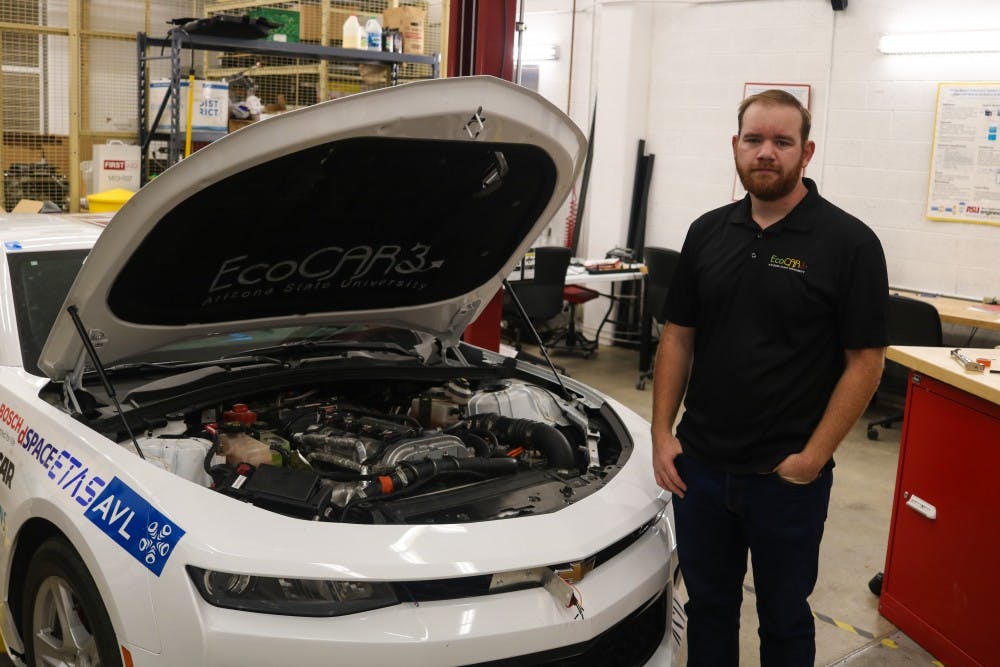EcoCAR 3, the product of a four-year competition between 16 different universities from around the U.S., is close to finishing its final year of development this May.
The competition, sponsored by the Department of Energy and General Motors, is to see which university can best convert a 2016 Chevrolet Camaro into a hybrid vehicle by applying cutting-edge technology while still retaining the look and safety features of the car. The finale of the competition calls for participants to drive their cars from Yuma through Fontana, California and will conclude in Hollywood. The finale will last from May 10 to May 22.
ASU is competing against 15 other schools around the country including Penn State and Ohio State.
By the end of the competition, each individual university keeps its own car and can do with it as it wishes.
In the past two years, ASU has received the Mathworks award in the competition.
Read More: ASU students near goals for energy-efficient Chevy Camaro
Mattie Whitt, a business management junior and communications manager for the team, said she believes what made working on this project special was the real world experience they gained.
"What makes the competition so unique is the fact that the students who are involved in it get hands-on experience because it imitates a real world vehicle development process,” Whitt said. “Essentially what they would be doing after they graduate in the automotive industry, they're doing now.”
Although the car has been in development for the past four years, it wasn't until around the time of competition three that it started running. Whitt said this year the team's primary focus for the competition is the car's overall performance.
"What we hope to achieve is to have one of the best preforming vehicles there, what I don't think a lot of people realize is when we received the car, we stripped everything away and essentially rebuilt the whole vehicle from scratch," Whitt said. "The fact that the car was running year three was a huge milestone, so that year's competition, we mainly focused on basic car functions like braking and steering."
Patrick Phillips, an automotive engineering senior and the team's project manager, said the most difficult part was keeping up with the timeline and his proudest moment he had working on the car was the first time he heard it run.
"We're doing something that someone does – in industry – 40 to 50 hours per week, and we're working that in with full-time class schedules, so balancing your time in the project is really difficult," Phillips said.
Even though this is a competition, Phillips said his team regularly works with the other teams to overcome shared problems.
"If one of the other teams says 'We're currently working on an issue with this' and that's an issue that we've already solved then we'll just hand them the solution," Phillips said. "This is a competition after all but it's beneficial to create a positive relationship amongst teams and it's something I'm super grateful for."
Hayden Hostetler, a senior in mechanical engineering systems and engineering manager, said he joined the team four years ago because of his love for cars as a kid and a recommendation a friend made to him.
"Before I even started at ASU, I had a buddy who was at ASU and he was telling me about this project that hadn't even started yet ... and it was the EcoCAR project," Hostetler said. "I was actually in the first meeting that ASU had for the EcoCAR project and I've been on the team ever since."
After working on the car for two years, Phillips admitted he'll miss working on the car with his devoted team of 20 members who have since become very close friends.
"It'll be bittersweet when it's over, it's nice to be able to relax a little bit but at the same time always pushing and wanting to do more, it meant a lot to have a project like this," Phillips said.
Hostetler said that following the end of the competition, ASU will retain the EcoCAR and develop it into a research and development project for future students. Right now, the plan is to turn the vehicle into a self-driving car.
"The plan as of right now is to continue to develop autonomous vehicle systems, so they'll use our hybrid vehicle as a baseline," Hostetler said. "Once those are a little more developed, they're gonna implement autonomous systems into it and use that as a teaching tool for students of the future."
Reach the reporters at amville8@asu.edu and mlutesad@asu.edu or follow @AustinMVillegas and @mackinleyjade on Twitter.
Like State Press on Facebook and follow @statepress on Twitter.




